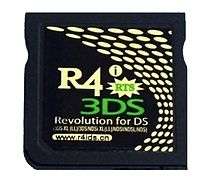Revolution for DS

The Revolution for DS (most known as R4DS or simply R4) is a series of flash cartridges for the Nintendo DS handheld system. It allows ROMs to be booted on the Nintendo DS handheld system from a microSD card. This allows the user to run homebrew applications, to store multiple games on a single memory card, and to play games that have been backed up by the user. It uses a microSD card for its firmware and games. The R4 flashcard's original developer stopped producing the R4 Card that plays ROMs for the Nintendo DS, however, there are a new line of R4 clones that have taken its place, notably the R4 3DS, R4 Gold, R4 DSi and R4 NES, which are used to play ROMs from various Nintendo platforms such as the Nintendo 3DS, Nintendo DSi, Nintendo DSi XL and Nintendo Entertainment System.
Original carts
The original Revolution for DS cart is no longer available. However, there are other carts that are of similar quality made by other entities that have adapted the name, commonly referred as 1:1 clones. These are flash carts that use exactly the same hardware and are, for all intents and purposes, also referred to as the original R4 revolution.
Legal issues
The R4 flash cartridges are banned in most countries due to copyright infringement lawsuits from Nintendo. In late 2007, Nintendo began a legal crackdown with a series of raids against R4 merchants.[1]
United Kingdom
In 2010, the company Playables Limited, importers of R4 flashcarts, was ruled against by the London High Court. The ruling outlawed any sales, importation, or advertising of the R4 flashcarts. The defence of Playables Limited claimed that the R4 flashcarts were legal because it uses a homebrew application. However, bypassing Nintendo’s security system is against the law in the United Kingdom. After the news broke, Nintendo released on a statement saying that they do support game developers that create their own applications legitimately. 100,000 copying devices including R4s were seized in 2009. Nintendo claimed that the carts were not only seized for the benefit of their own company, but the benefit for over 1400 video game companies that depend on the sales of their games.[1][2]
France
In October 2011, the R4 carts were banned in France. An official release by the Paris court of appeals ruled against five R4 sellers and distributors. The sellers and distributors were fined over €460,000, and some were sentenced to jail.[1] Stephan Bole, the managing director of Nintendo France released a statement saying “Nintendo supported this criminal action not only for the company’s sake, but for the interests of its game developer partners who spend time and money legitimately developing software for Nintendo’s game platforms, and customers who expect the highest standards and integrity from products bearing the Nintendo name.” [3]
Japan
In 2009, the government of Japan outlawed the sales of the R4 flashcart.[4] In 2012, the Japanese Minstery of Economy, Trade, and Industry revealed that the importing of R4 carts, and similar devices, is now punishable by law.[5] In 2013, Nintendo won a court case against two R4 cart distributors in Japan. The Tokyo district court ruled that the sellers of the R4 carts owed Nintendo and 49 other video game developers ¥95,625,000.[4]
Germany
In 2009, Nintendo lost a lawsuit against a seller of flashcarts, however Nintendo won the second and final instance. Since December 2014, flashcarts are officially illegal due to Germany's copyright law. The seller and distributor of the R4 flashcarts was fined over €1 million.[6]
Other countries
Other countries that have banned the R4 flashcarts include Australia,[7] Italy, Belgium, and the Netherlands.[1]
See also
References
- 1 2 3 4 Ashcraft, Brian. http://www.kotaku.com.au/2011/10/r4-devices-are-now-illegal-in-france/. Retrieved 3 April 2014. Missing or empty
|title=(help) - ↑ Henderson, Rick. http://www.pocket-lint.com/news/105062-uk-renders-r4-carts-illegal. Missing or empty
|title=(help) - ↑ "Nintendo DS: Nintendo Gains 4.8m Million In Piracy Battle, Bans R4 Flash Carts". 3 October 2011.
- 1 2 Mallory, Jordon. http://www.joystiq.com/2013/07/09/nintendo-wins-another-legal-battle-against-r4-flashcart-reseller/. Retrieved 3 April 2014. Missing or empty
|title=(help) - ↑ Ashcraft, Brian. http://kotaku.com/5962758/r4-cartridges-blocked-in-japan-by-the-government/all. Missing or empty
|title=(help) - ↑ "Nintendo: Oberlandesgericht München: Flashkarten sind illegal".
- ↑ B., Karl. "Nintendo wins R4 case in Australia".